初中英语语法班第一课
英语必学语法第一课——名词
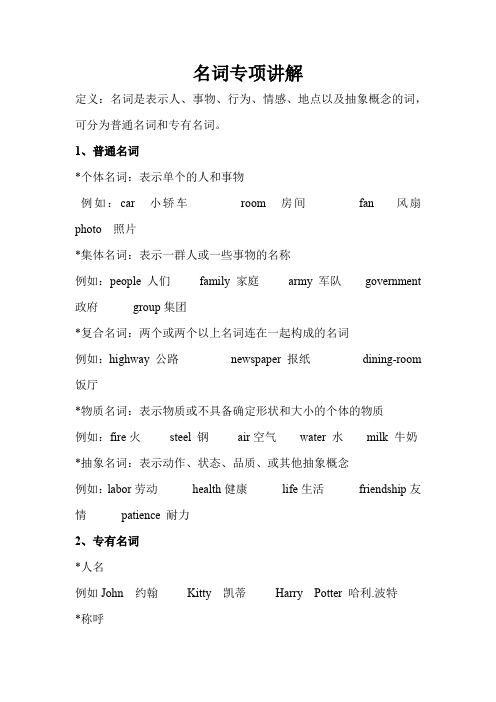
名词专项讲解定义:名词是表示人、事物、行为、情感、地点以及抽象概念的词,可分为普通名词和专有名词。
1、普通名词*个体名词:表示单个的人和事物例如:car 小轿车room 房间fan 风扇photo 照片*集体名词:表示一群人或一些事物的名称例如:people 人们family 家庭army 军队government 政府group集团*复合名词:两个或两个以上名词连在一起构成的名词例如:highway 公路newspaper 报纸dining-room 饭厅*物质名词:表示物质或不具备确定形状和大小的个体的物质例如:fire火steel 钢air空气water 水milk 牛奶*抽象名词:表示动作、状态、品质、或其他抽象概念例如:labor劳动health健康life生活friendship友情patience 耐力2、专有名词*人名例如John 约翰Kitty 凯蒂Harry Potter 哈利.波特*称呼例如:Mr.Brown 布朗先生Miss Fang 方小姐*品牌例如:Teddy Bear 泰迪熊*月份例如:January一月February二月March三月*星期例如:Sunday星期一Monday星期二Tuesday星期三*节日例如:Christmas圣诞节the Children’s Day 儿童节*建筑、公园、车站、路名例如:the Great Wall长城the Century Park世纪公园Yan’an Rord延安路ZhongShan Park Station 中山公园站*学科、语言例如:China中国Australia澳大利亚Nanjing南京Beijing北京二、名词还分为可数名词和不可数名词1、可数名词:能够以数目来计算,可以分为个体的人或者东西单数:数量是1,如:a cow (一头牛),a book(一本书),an apple (一个苹果)等。
An用于以元音音素开头的名词之前,a用于以辅音音素开头的名词之前复数:数量超过一,如tow pens(两支钢笔),four pigs(四头猪),some boys (一些男孩)等。
新目标英语七年级上Unit1教案:轻松掌握英语语法的技巧汇总
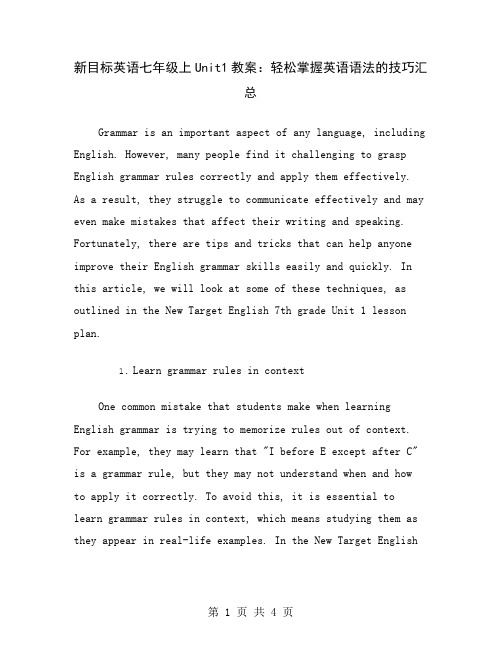
新目标英语七年级上Unit1教案:轻松掌握英语语法的技巧汇总Grammar is an important aspect of any language, including English. However, many people find it challenging to grasp English grammar rules correctly and apply them effectively. As a result, they struggle to communicate effectively and may even make mistakes that affect their writing and speaking. Fortunately, there are tips and tricks that can help anyone improve their English grammar skills easily and quickly. In this article, we will look at some of these techniques, as outlined in the New Target English 7th grade Unit 1 lesson plan.1.Learn grammar rules in contextOne common mistake that students make when learning English grammar is trying to memorize rules out of context. For example, they may learn that "I before E except after C" is a grammar rule, but they may not understand when and howto apply it correctly. To avoid this, it is essential tolearn grammar rules in context, which means studying them as they appear in real-life examples. In the New Target English7th grade Unit 1, the lesson plan suggests using texts, dialogues, and exercises to teach grammar rules in context.2.Focus on the most important rulesWhile there are many grammar rules in English, not all of them are equally important. According to the New Target English 7th grade Unit 1 lesson plan, some rules appear more frequently than others and play a more significant role in communication. For example, subject-verb agreement, articles, and prepositions are fundamental rules that students should learn first. By prioritizing the most important rules, students can build a strong foundation for their grammarskills and improve gradually.3.Practice regularlyLike any skill, mastering English grammar requires practice. According to the New Target English 7th grade Unit 1 lesson plan, students should practice regularly by doing exercises, writing short paragraphs, and engaging in conversations. By practicing frequently, students can reinforce their understanding of grammar rules, identifytheir weaknesses, and improve their confidence.e visualsVisual aids, such as charts, diagrams, and infographics, can help students understand grammar rules visually and remember them better. The New Target English 7th grade Unit 1 lesson plan suggests using visuals to illustrate grammar concepts such as tenses, parts of speech, and word order. By using visuals, students can visualize the rules and apply them more effectively.5.Play gamesLearning grammar can be fun as well as challenging. According to the New Target English 7th grade Unit 1 lesson plan, playing games is an excellent way to make grammar lessons more enjoyable and interactive. Games such as board games, puzzles, and online quizzes can be used to reinforce grammar concepts and engage students in a fun way.In conclusion, learning English grammar does not have to be a daunting task. By following these tips from the New Target English 7th grade Unit 1 lesson plan, students can make steady progress and develop strong grammar skills that will serve them well in their future studies and career. By learning grammar rules in context, focusing on the mostcritical rules, practicing regularly, using visuals, and playing games, students can achieve success in mastering English grammar.。
初中基础语法(第一课 词法概述)

初中基础语法(第一课词法概述)第一部分词法一、词法内容概述1、词法主要研究各种词类的形式及其用法。
词类分为实词(名词、代词、形容词、数词、动词、副词)虚词(冠词、介词、连词、感叹词)2、英语词汇四种重要的形式变化(1)名词有单数、复数的变化。
(2)代词有主格、宾格、所有格等的变化。
(3)动词有人称、时态、语态等形式的变化。
(4)形容词和副词有比较级和最高级的变化。
二、英语构词法(Word Formation)(一)合成法(compound)把两个或两个以上的词合在一起而构成一个新词,这种构词法称为合成法。
(合成名词/形容词/副词/代词/动词)(二)派生法(derivation)在一个单词(词根)前或后加上一个词缀,构成一个新词,这种构词法称为派生法。
词缀分为前缀和后缀。
1、前缀(1)表示否定或相反的含义un- 形容词unhappy不高兴的、副词unusually不同寻常地、动词uncover揭开dis- 形容词dishonest不诚实的、动词dislike不喜欢、名词discomfort不适mis-动词misunderstand误解im-形容词impossible不可能的in-形容词incorrect不正确的ir-形容词irresponsible不负责任的(2)表示重复re-动词rewrite 重写(3)表示“使”en-动词enrich 使富有2、后缀(1)名词后缀-er teacher老师hunter猎人reader读者-or actor男演员director导演imventor发明家-ress actress女演员waitress女服务员-ese Japanese日本人Chinese 中国人-an Canadian加拿大人Australian澳大利亚人American美国人-ist artist艺术家pianist钢琴家typist打字员-ent agreement同意movement 运动treatment对待-ion operation手术celebration庆祝congratulation祝贺-ship friendship友谊leadership领导职位relationship关系scholarship奖学金-hood boyhood少年时代childhood儿童时代-th truth真理youth年轻人warmth温暖-dom freedom自由wisdom智慧kingdom王国-ing building建筑物,楼房feeling感觉dancing舞蹈-ness kindness和蔼illness疾病brightness明亮(2)形容词后缀-able/-ible comfortable 舒适的;enjoyable 令人愉快的responible 负责的-al natural 自然的musical 音乐的national 国家的-ic/-ical-ish-ful-less-ly-en-y-en-y-ous-ed-ing-ward(3)副词后缀-ly-ward/-wards(4)动词后缀-en(三)转化法(converdion)1、一般情况下,转化前后的单词读音不变,只转换词性。
初中英语语法讲座(一)
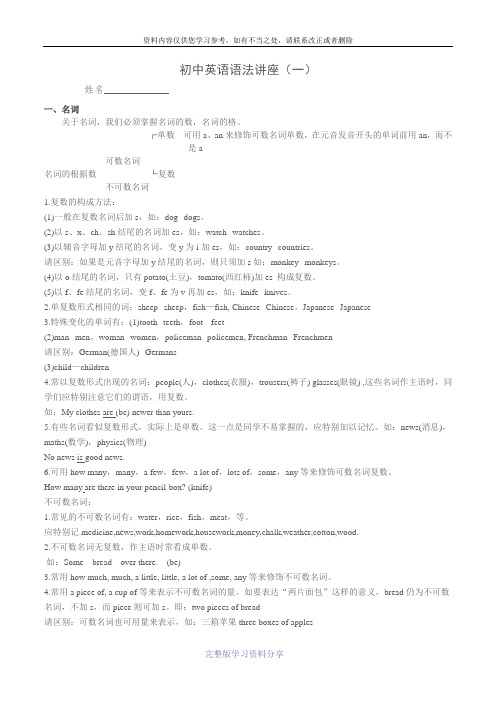
初中英语语法讲座(一)姓名_____________一、名词关于名词,我们必须掌握名词的数,名词的格。
┌单数---可用a、an来修饰可数名词单数,在元音发音开头的单词前用an,而不是a可数名词名词的根据数└复数不可数名词1.复数的构成方法:(1)一般在复数名词后加s,如:dog--dogs。
(2)以s、x、ch、sh结尾的名词加es,如:watch--watches。
(3)以辅音字母加y结尾的名词,变y为i加es,如:country--countries。
请区别:如果是元音字母加y结尾的名词,则只须加s如:monkey--monkeys。
(4)以o结尾的名词,只有potato(土豆),tomato(西红柿)加es 构成复数。
(5)以f、fe结尾的名词,变f、fe为v再加es,如:knife--knives。
2.单复数形式相同的词:sheep--sheep,fish—fish, Chinese--Chinese,Japanese--Japanese3.特殊变化的单词有:(1)tooth--teeth,foot-- feet(2)man--men,woman--women,policeman--policemen, Frenchman--Frenchmen请区别:German(德国人)--Germans(3)child—children4.常以复数形式出现的名词:people(人),clothes(衣服),trousers(裤子) glasses(眼镜) ,这些名词作主语时,同学们应特别注意它们的谓语,用复数。
如:My clothes are (be) newer than yours.5.有些名词看似复数形式,实际上是单数。
这一点是同学不易掌握的,应特别加以记忆。
如:news(消息),maths(数学),physics(物理)No news is good news.6.可用how many,many,a few,few,a lot of,lots of,some,any等来修饰可数名词复数。
初一英语第一课教案(人教版英语七年级)

初一英语第一课教案(人教版英语七年级)一、本堂课教学重点:熟悉并且掌握英语常用词性的概念以及基本用法。
第一关:重点词性名词、动词、代词、数词、冠词基本用法,区别。
一、48个国际音标及26个英文字母的正确书写要熟练掌握元音和辅音,5个元音字母(a, e, i, o, u),字母的正确占格及单词间距。
二、名词(单复数变化,单复同行,不可数,所有格)1.可数名词变复数可数名词变复数时,有规则变化和不规则变化两种。
规则变化:1)一般情况直接在词尾加“-s ”,如:cake-cakes, bag-bags, day-days, face-faces, orange-oranges等;2)以s, x, sh, ch结尾的词,要在词尾加“-es ”,如:bus-buses, watch-watches, box-boxes 等;3)以辅音字母加y结尾的词,变y为i再加“-es ”,如:baby-babies, country-countries, family-families等;4)部分以f (e)结尾的词,变f (e)为“ves ”,如:knife-knives, half-halves等;5)以o结尾的词,加“-s ”或“-es ”,如:zoo-zoos, photo-photos, tomato-tomatoes, potato-potatoes等。
记忆口诀:除了“英雄”hero外,凡是能吃的,加“-es ”,不能吃的加“-s ”。
不规则变化:1)改变单数名词中的元音字母:man-men, woman-women, foot-feet, tooth-teeth等;2)其他形式:mouse-mice, child-children等。
2.单、复同形:sheep-sheep, Chinese-Chinese, Japanese-Japanese等;3.名词所有格1、Kangkang\'s books;Tom and Helen\'s desk; Ann\'s and Maria\'s bikes;2、用of表示“......的”,但要从of后往of前翻译:a book of mine(我的一本书)3、have与of的区别:have一般表示“主动拥有”,往往用于有生命的人或动物;无生命的物体一般不能“主动拥有”,表示所属关系时要用of。
八年级语法第一次课
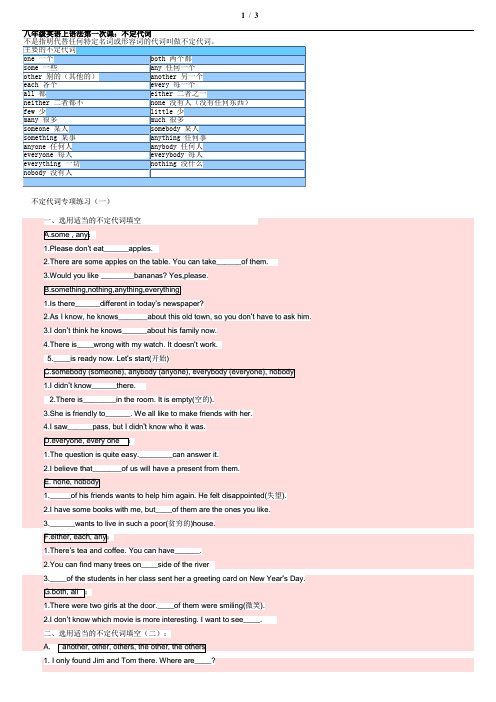
8. It is always hard to tell the twins one from______. B. few, a few, little, a little : 1.There is a little bird in the tree, but only ______ people saw it. 2.Could I have______words with you, Miss W hite? 3. W e don’t like him, because he does______for other people. 4. He has friends here and he seldom goes out on weekend.
5. There is only_____water in the pot(锅). C .neither, none, either : 1.I know_____of the two students. 2.He doesn’t agree with_____of his parents on many things. D .one, the one, ones, one’s : 1.These shirts are too small. I want to have some bigger______. 2.W hich boy is your son? —_____in a red cap. 3._____has to do_____best. 4.I have only one small flower on my desk and she has three big______. 三、选择填空: 1.Have you seen the three apples on the table? You can take ______ of them. A. the one B. something C. anything D. any
英语语法第一课
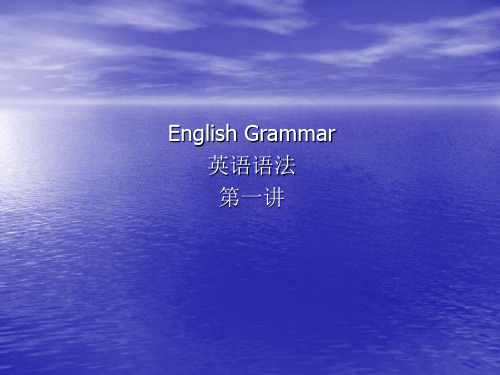
语的动作和状态的。
• 3.表语(predicative)它是放在连系动词之
后表示主语的身份或特征的。表语也就是 主语补语。补语(complement)分为主语补 语和宾语补语。
• 4.宾语(object)它是表示及物动词动作的
对象的。
• 5.定语(attribute)它是限定或修饰名词或
English Grammar 英语语法 第一讲
1.语法是什么? (What is grammar? )
• 语法是语言的组织规律, 它赋予语言以结构
系统。(the entire system of a language, including its syntax, morphology, semantics, and phonology)
• 7.冠词(article, 缩写为art.) 说明名词所指的
人或物的词。An article is a name for the (definite article) and a, an (indefinite
article).
• 8.介词(preposition,缩写为prep.) 表示名词
• 4.他是我的顶头上司。 • He is above me. • 5.微积分对我来说太难了。 • Calculus was always beyond me. • 6.你打这个电话就能找到我。 • You can reach me at this phone number.
4. How does that song go?
• 具体地讲, 主要有下列六种句子成分。
• 1. 主语(subject)它是句子所要说明的人
或事物, 是一句的主体。The subject is the part of the sentence that names whom or
仁爱英语七年级上册语法精讲(一)
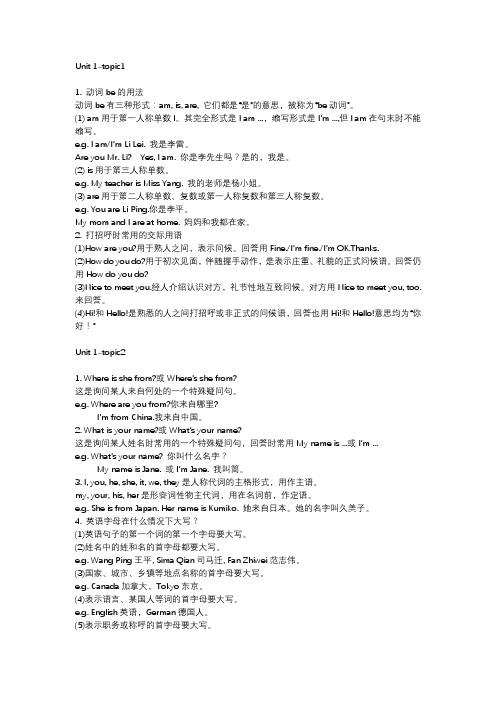
Unit 1-topic11. 动词be的用法动词be有三种形式:am, is, are, 它们都是“是”的意思,被称为“be动词”。
(1) am用于第一人称单数I。
其完全形式是I am ...,缩写形式是I’m ...,但I am在句末时不能缩写。
e.g. I am/I’m Li Lei. 我是李雷。
Are you Mr. Li? Yes, I am. 你是李先生吗?是的,我是。
(2) is用于第三人称单数。
e.g. My teacher is Miss Yang. 我的老师是杨小姐。
(3) are用于第二人称单数、复数或第一人称复数和第三人称复数。
e.g. You are Li Ping.你是李平。
My mom and I are at home. 妈妈和我都在家。
2. 打招呼时常用的交际用语(1)How are you?用于熟人之间,表示问候。
回答用Fine./I’m fine./I’m OK.Thanks.(2)How do you do?用于初次见面,伴随握手动作,是表示庄重、礼貌的正式问候语。
回答仍用How do you do?(3)Nice to meet you.经人介绍认识对方,礼节性地互致问候。
对方用Nice to meet you, too.来回答。
(4)Hi!和Hello!是熟悉的人之间打招呼或非正式的问候语,回答也用Hi!和Hello!意思均为“你好!”Unit 1-topic21. Where is she from?或Where’s she from?这是询问某人来自何处的一个特殊疑问句。
e.g. Where are you from?你来自哪里?I’m from China.我来自中国。
2. What is your name?或What’s your name?这是询问某人姓名时常用的一个特殊疑问句,回答时常用My name is ...或I’m ...e.g. What’s your name? 你叫什么名字?My name is Jane. 或I’m Jane. 我叫简。
- 1、下载文档前请自行甄别文档内容的完整性,平台不提供额外的编辑、内容补充、找答案等附加服务。
- 2、"仅部分预览"的文档,不可在线预览部分如存在完整性等问题,可反馈申请退款(可完整预览的文档不适用该条件!)。
- 3、如文档侵犯您的权益,请联系客服反馈,我们会尽快为您处理(人工客服工作时间:9:00-18:30)。
初中英语语法精讲班:第一课语法体系导入图:一,名词1、英语名词可分专有名词和普通名词两大类:2、英语可数名词的单复数:英语可数名词有单数和复数两种形式。
3、名词所有格:名词所有格表示所属关系,相当于物主代词,在句中作定语、宾语或主语。
二、代词:1、代词的分类:人称代词、物主代词、反身代词、指示代词、关系代词、疑问代词、连接代词和不定代词等等。
2、人称代词:人称代词代替人和事物的名称,分为主格和宾格两种形式。
第一人称单数第二人称单数第三人称单数第一人称复数第二人称复数第三人称复数阳性阴性中性主格I(我)you (你) he(他)she(她)it(它)we(我们)you(你们)they (他们,她们,它们)宾me you (你) him her it us you them (他们,格(我) (他) (她) (她) (我们) (你们) 她们,它们) 3、物主代词:说明事物所属关系的代词,分为形容词性和名词性两种。
第一人称单数第二人称单数第三人称单数第一人称复数第二人称复数第三人称复数阳性阴性中性形容词性my(我的)your(你的)his(他的)her(她的)its(它的)our(我们的)your(你们的)their (他们的,她们的,它们的)名词性mine(我的)Yours(你的)his(他的)hers(她的)its(她的)ours(我们的)yours(你们的)theirs(他们的,她们的,它们的)4、反身代词:表示谓语的动作与主语有关或者宾语补足语的动作与宾语有关。
第一人称单数第二人称单数第三人称单数第一人称复数第二人称复数第三人称复数阳性阴性中性myself (我自己)yourself(你自己)himself(他自己)herself(她自己)itself(它自己)ourselves(我们自己)yourselves(你们自己)themselves(他们/她们/它们自己)5. 指示代词:指示说明近处或者远处、上文或者下文、以前或者现在的人或事物。
单数复数含义this(这个) these(这些) 指较近的人和物that(那个) those(那些) 指较远的人和物such (这样的人/物)指上文提过的人和物same (同样的人/物)指和上文提过的相同的人和物it (这人/这物) 指不太清楚是谁或者是什么时6、关系代词:用来引导定语从句的代词叫关系代词,参见后面的定语从句。
7.、不定代词:代替或修饰不特指的人或事物的代词叫不定代词。
单数含义some anynonone/ /each(every)oneeither,neithersothe other,another复合不定代词不可数含义muchlittle,a littleall/ ////复数含义manyfew,a fewones bothothers,the others※注:复合不定代词有12个:something(某事), someone(某人), somebody(某人), anything(任何事), anyone(任何人), anybody(任何人), nothing(没事),nobody(没有人), no one(没有人), everything(一切),everyone(每个人), everybody(每个人).(1)some和any 的用法:(2)no和none的用法:(3)all和both的用法:(4)every和each用法:every是形容词,只能作定语修饰单数名词,意思是“每一个”,表示整体概念;each是形容词、代词,可用作主语、宾语、定语等,意思是“每个”或者“各个”,表示单个概念;each可以放在名词前,可以后跟of短语,与动词同时出现时要放在“be动词、助动词、情态动词”之后或者行为动词之前every和each都用作单数理解,但是下文中既可以用单数的代词(如he/him/his)也可以用复数的代词(如they/them/their)替代。
如:Every one of the students in his class studies very hard.(他班上每个学生学习都很用功) / They are verybusy. Each of them has something to do.(他们很忙,人人都有事干)(5)either和neither的用法:(6)other、the other和another的用法:(7)many和much的用法:(8)few、little、a few、a little的用法:(9)复合不定代词somebody ,something ,anything, nothing ,everything, everybody等是由some , any ,no ,every, 加上body, thing构成的,叫做复合不定代词,在句子中当单数使用。
s(10)one与ones用来代替上文的一个或多个人或事物,前面可以加冠词、形容词、指示代词、which等。
如:Which jacket wouldyou like, this one or that one?(你要哪件夹克,这件还是那件?/ I don’t like the green ones.(我不喜欢绿色的那些) (13)none、no one、nobody的区别:no one和nobody都表示“没有人”,仅指人,后面不跟of短语,作主语时谓语用单数形式;none表示“没有一个人/物”,可指人也可以指物,后面可跟of短语,作主语时谓语可用单数也可用复数。
如:No one knows how he managed to get the ticket .(没有人知道他是怎样搞到那张票的) / Nobody handed in his/their composition(s) yesterday.(昨天没有一个人交作文。
) / None of my friends came to see me that day.(那天没有一个朋友来看我。
)9、相互代词:表示相互关系的词叫相互代词。
10、疑问代词:用来提出问题的代词称为疑问代词。
who、whom、whose、what、which、whoever、whatever、whichever名词和代词练习题1. They got much _____ from those new books.A. ideasB. photosC. newsD. Stories2. I have two _______ and three bottles of _________ here.A. orange, orangeB. oranges, orangesC. oranges, orangeD. orange, oranges3. Every evening M r. King takes a _________ to his home .A. 25 minutes' walkB. 25 minute's walkC. 25 minute walkD. 25 minutes walk4. An old _______ wants to see you.A. peopleB. personC. the peopleD. the person5. Help yourself to __________.A. chickens and applesB. chickens and appleC. chicken and appleD. chicken and apples6. Oh, dear. I forgot the two _________.A. room's numberB. rooms' numberC. room numbersD. rooms' numbers7. She has been in Tianjin for ten years. Tianjin has become her second _________.A. familyB. houseC. homeD. room8. ________ mothers couldn't go to the meeting, because they have gone to Shanghai .A. Mary and Peter'sB. Mary and PeterC. Mary's and PeterD. Mary's and Peter's9. Li Lei has been to __________ many times this month.A. her uncleB. her uncle'sC. her unclesD. aunt's10. He is a success as a leader but he hasn't ________ in teaching.A. many experiencesB. much experienceC. an experienceD. a lot experience11. A classmate of _________ was here ten minutes ago.A. youB. yourC. your sisterD. your sister's12. A group of _________ are talking with two ___________.A. Frenchmen, GermansB. Germans ,FrenchmansC. Frenchmans , GermenD. Germen , Frenchmen13.The team ________ having a meeting .A. isB. areC. amD. be14. "Would you like _________?" "________, please."A. drink, Three coffeesB. a cup of drink, CoffeesC. a drink, A coffeeD. a drink, Three cups of coffees15. The Great Wall was made not only by _______, but also the flesh and blood of ________ men.A.earth and stone, millions ofB. earths and stones, millionsC. the earth and stone, million ofD. the earths and stones, millions1.Last night, there was a food accident. The _______ were ill, but no _______ were lost.A. child, livesB. children, lifeC. children, livesD. child, life2. ---This is a photo of _________ when they were young.---OK, how happy they both looked!A. my father and motherB. my mother and father'sC. my mother's and father'sD.my father's and my mother3. The new student is in __________ , Grade Two.A. Class ThirdB. Third ClassC. Class ThreeD. Three class4. Today is September 10th. It's __________ Day. Let's go and buy some flowers for our teachers.A. TeachersB. Teachers'C. the Teachers'D. Teacher's5. The market isn't far from here. It's only _________ bicycle ride.A.half an hours'B. half an hour'sC. half an hourD. an hour and a half6. --- What would you like to drink, girls?--- _________, please.A.Two cup of coffeeB. Two cups of coffeC. Two cups of coffeeD. Two cups of coffees7. During Christmas, people get together and sing Christmas songs for _________.A. funB. wishesC. interestD. thanks8. Some _________ are flying kites near the river.A. childB. boyC. boysD. childs9. After the exam, we'll have________ holiday.A. two weeksB. two-weeksC. two weeks'D. two week's10. They are those _________ bags.Please put them on the bus.A. visitorB. visitorsC. visitor'sD. visitors'11.--- How many workers are there in your factory?--- There are two ___________.A. hundredsB. hundredC. hundred ofD. hundreds of12. ---What do you think of the _______ the Moonlight Sonata by Beethoven?--- It sounds really wonderful.A. subjectB. musicC. bookD. animal13. There is not enough _________ in the corner for the fridge.A. placeB. roomC. fieldD. ground14. _________ comes from sheep and some people like eating itA. WoolB. PorkC. MuttonD. Milk15. If you don't take more ________, you'll get fat.A. medicineB. lessonsC. photosD. exercise16. My school is about twenty ________ walk from here.A. minuteB. minutes'C. minutes'sD. minutes17. Mum, I have _______ to tell you!A. a good newsB. some good newsC. some good newesD. much good news18. Which is the ________ to the post office?A. streetB. wayC. roadD. address19. I stayed at ________ last Sunday.A. my unclesB. my uncles'C. my uncle'sD. my uncle's family20. Maths ________ not easy to learn.A. areB. isC. amD. Were代词练习题1 These are ___books. Yours are over there.A IB myC meD mine2 —___is she?—She is a teacher.A WhatB HowC WhoD Where3___is wrong with my watch. It has stopped___.A Something, workingB Something, to workC Any thing, workingD Anything, to work4 Mary, help ___to the bananas, please.A youB yourC yourselfD yourselves5 —___do you go to school every day?—By bus.A HowB WhyC WhenD Where6 My skirt is___popular than___.A much, herB much, hersC more, herD more, hers7 —Can you speak English?—Yes, but only___.A fewB a fewC littleD a little8 Mr.Smith is an old friend of___.A IB meC myD mine9 “___do you hear from your parents?”“About once a month.”A How longB How manyC How oftenD How much10 Mr Green wouldn't say ___at the meeting.A everythingB nothingC anythingD something11 “Mum, Ann's coming tonight. Let's give her ___to eat.”“Good idea!”A anything niceB nice anythingC something niceD nice something12 —When shall we meet, this evening or tomorrow evening?—I don't mind. ___time is OK.A SomeB NeitherC EitherD Both13 This is not her kite,but___.A he'sB himC heD his14 Don't worry, Mum! ___news is good news. I'm sure daddy will come back soon.A NoB ManyC ThoseD Two15 Mary has six apples. Her brother has three. She has ___apples than he.A fewB manyC moreD fewer16 There isn't ___in today's newspaper.A anything interestingB something interestingC nothing interestingD interesting anything17 September 10th is___Day?A TeacherB TeachersC Teacher'sD Teachers'18 —In England, people eat a lot of “takeaway”food. What about people in your country? —___A So we do.B We do so.C So do we.D We so do.19 —Shall we go into that shop and have a look?—Sorry. I won't. I have ___to do there.A everythingB anythingC somethingD nothing20—Oh, dear! Who broke the glass?—___Sam ___Bruce. It was the cat.A Both, andB Not, butC Neither, norD Either, or21 The students are having a good time in the park. Some are drawing by the lake.___are climbing the hill.A OthersB OtherC AnotherD The other22 She is not a nurse. I'm not___.A alsoB eitherC neitherD too23 I have two pencils. One is red,___is blue.A the otherB anotherC othersD the others24 Sorry, I can't answer your question. I know ___about the subject.A littleB a littleC fewD a few25 My sister doesn't like skating. ___.A So do IB So I don'tC Neither I don'tD Neither do I26 Yesterday morning there were only three boys in our room,___.A you, he and IB I, you and heC he, I and youD you, I and he27 All the students are busy, so___of them will go to the concert.A manyB littleC a fewD few28 The teacher gave ___student a new book.A nobodyB bothC eachD any29 Black is neither a teacher ___a worker.A orB eitherC norD and30 Our teacher gave us___on studying.A many advicesB some advicesC an adviceD some advice31 There are two foreign friends in the park. One ___is from Japan, is from America.A otherB othersC the otherD the others32 Are there ___on the table?A some cupsB any cupC some cupD any cups33 I've just bought five stamps. One is a German stamp, ___are American stamps.A the otherB the othersC otherD others34 It was___fine day that they went to the park.A a soB so aC such aD a such35 At that time the train was slow and noisy. So___people liked taking trains.A littleB a littleC fewD a few36 We must help and understand each___.A otherB anotherC othersD the other37 ___is difficult to walk on the moon.A ManB OneC ThatD It38 Jane has sent several letters, but ___of them have been answered.A allB bothC eitherD none39 I don't know ___about the new headmaster.A somethingB everythingC nothingD anything40___of the students in the whole class could do this physics question.A NoB NoneC NotD Neither。
